Physiological Factors:
Personal and Family Factors
The particular configuration of factors affecting a given unit in a given operation shapes the outcome of that operation. Its influence extends beyond the given operation to affect the future ability of individual soldiers and the unit as a whole to conduct operations and of individual soldiers to go on to lead full and fulfilling lives. When the particular configuration of factors is in a unit's favor, the result is a more successful operation with fewer physical casualties, a lower rate of both acute and delayed combat stress casualties, and less long term disability. Ensuring that the configuration of factors is, in so far as humanly possible, in the unit's favor is the responsibility of commanders. This includes commanders at all echelons of command and control -- from theater, through corps, division, battalion, company, to platoon, squad, and, finally, to the individual soldier. The individual soldier faces challenges in command, control, communication, and intelligence (C3I) qualitatively similar, though more limited in space and time, to those faced by the theater commander. From the individual soldier upwards, commanders are responsible for themselves, their peers, and their subordinates.
This paper focuses on sleep because of sleep's importance in sustaining performance and as a case study of the interplay between command responsibility, personal responsibility, operational planning, technology, and outcome that characterize the present and future conduct of operations. Outcome here is construed broadly. It includes the outcome of the operation, the outcome for the unit in terms of unit effectiveness in future operations, and the outcome for the individual soldiers in terms of individual effectiveness in future operations and in terms of the individual soldier's ability to lead a full and fulfilling life.
Sleep, Sleep Deprivation and Combat/Operational Performance
Effective cognitive performance is central to successful combat operations. Command, control, communication, and intelligence (C3I) are essential for successful operations at all levels - from crew, squad, and platoon through division and corps. Battles can be won or lost at any level, including the small unit level (company, platoon, squad, and crew) (English, 1984). A single, small group delivering modest amounts of fire at the right place and at the right time can determine the outcome of a major engagement (Marshall, 1978). Laboratory studies show that mental work declines by 25% during each successive 24 hours of continuous wakefulness. Sleep-deprived individuals are able to maintain accuracy on cognitive tasks, but speed declines as wakefulness is extended. When sleep-deprived, a soldier's thinking can slow to the point that he cannot reach a correct decision within the available time. If the decision is system-critical, the system fails. Sleep deprivation degrades the higher, more complex mental processes. Soldiers lose battlefield awareness. They lose the ability to integrate information into a coherent and accurate representation of the tactical situation. In contrast, simple mental processes are unaffected. This disparity between the effects of sleep deprivation on simple and complex mental abilities helps explain friendly fire incidents. In the sleep-deprived state, soldiers can still put the cross-hairs on a target and fire rounds accurately down range, but their orientation to the terrain and tactical situation degrades. They can shoot and shoot accurately but no longer can distinguish friend from foe. This is not to say that soldiers and combat units cannot fight when short of sleep; they will just be less effective. To borrow from General Patton, the idea is not to lose sleep for your country but to get the enemy soldier to lose sleep for his.
Sleep in the U.S. Army Ranger School and National Training Center (NTC)
Continuous combat is characterized by brief, fragmented sleep. Brief, fragmented sleep is typically reported in anecdotal accounts of actual combat operations, and has been objectively verified in studies of simulated combat operations. We studied sleep patterns (using our wrist-worn Sleep/Activity Monitor described below) during the 58 days of U.S. Army Ranger School. These 58 days involve simulated light infantry operations against a superior force. In a study of one class, ranger candidates averaged 3.2 hours of sleep each night over the 58 days of the school (Pleban et al., 1990). In a second study of two classes, ranger candidates averaged 3.6 hours each night (see figure -- Ranger School: Average Daily Sleep in each of the Four Phases). This sleep was not accrued in a single sleep period, but rather occurred as several naps over each 24 hours. Anecdotally, cognitive performance in ranger candidates is marginal, with frequent episodes of what the rangers call "droning"—i .e., the candidates can put one foot in front of another and respond if challenged, but have difficulty grasping their situation or acting on their own initiative.
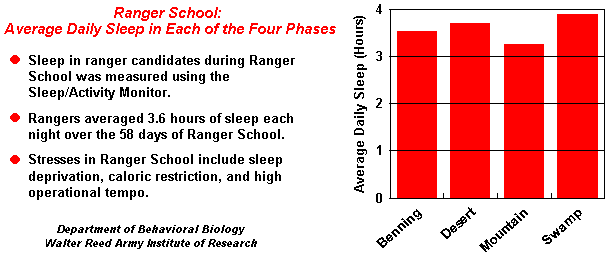
We also studied actigraphically-recorded sleep during simulated armored and mechanized infantry operations at the National Training Center (NTC) in the high desert of Southern California. These operations involve battalion sized task forces, and consist of 14 days of force-on-force and live-fire exercises. As in the Ranger School study, sleep at the NTC was brief and fragmented. Notable in this study were the clear correlations between sleep and rank (see figure -- National Training Center (NTC) Average Hours of Daily Sleep by Rank), and between sleep and echelon of command and control (see figure -- National Training Center (NTC) Average Hours of Daily Sleep by Echelon). Whereas the personnel at the squad and crew level averaged between 7-8 hours of sleep each night, those at battalion and brigade level averaged little more than 4 hours of sleep each night. Thus, from the perspective of sleep and its effects on performance, we would expect personnel at lower echelons to be more effective than personnel at higher echelons. Our observations confirmed this prediction—we saw the more junior personnel improving their performance over the course of the exercise, with the more senior, higher echelon personnel "droning".
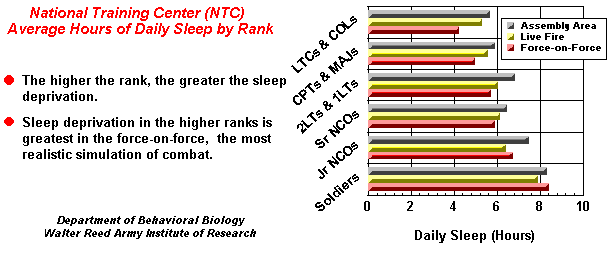
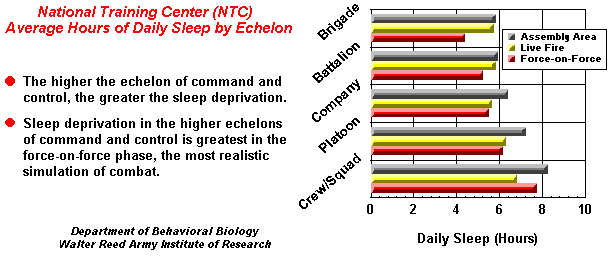
A Laboratory Simulation of an Artillery Fire Direction Center
We have found impaired complex mental functions in a study of sleep deprivation in a simulation of artillery fire direction center (FDC) team operations (Banderet et al., 1981). FDCs at the time of our study were manned by 5-person teams and were equipped with two charts for plotting targets. Their task was to plot the location of a target (as given by observers further forward) and derive range, bearing, angle of gun elevation, and charge. Targets were identified by simulated forward observers and called in on the fly with requests for immediate fire (fire missions), or they were identified and called in advance for firing upon at a later time (pre-planned targets). In either case, the FDC must derive range, bearing, etc. upon receipt of the target location. In the case of a fire mission, the FDC must send this information immediately to the guns; in the case of a preplanned target, the FDC must hold the information until a call for fire on that target is received. In the process of plotting target location, the FDC must update its situation map and check the target on the map to be sure that the location plotted is not that of a hospital, school, church, or other proscribed target. At the time we conducted our study, FDC teams were able to process two fire missions concurrently. In our study, FDC teams from the 82nd Airborne division were tested during simulated continuous combat operations lasting 36 hours. Throughout the 36 hours, their ability to accurately derive range, bearing, elevation, and charge was unimpaired. However, after circa 24 hours they stopped keeping up their situation map and stopped computing their pre-planned targets immediately upon receipt. They lost situational awareness; they lost their grasp of their place in the operation. They no longer knew where they were relative to friendly and enemy units. They no longer knew what they were firing at. Early in the simulation, when we called for simulated fire on a hospital, etc., the team would check the situation map, appreciate the nature of the target, and refuse the request. Later on in the simulation, without a current situation map, they would fire without hesitation regardless of the nature of the target. Early in the simulation, when we called in two concurrent fire missions and for fire on a pre-planned target, they would, having already plotted and derived information for the pre-planned target, fire upon all three quickly and accurately. Later on in the simulation, when we called in, simultaneously, two concurrent fire missions and called for fire on a pre-planned target, the team, having neglected to plot and derive information for the pre-planned target, would try to plot and derive information for three targets concurrently using the two charts (three missions and two charts and chart operators). In this effort they typically became disorganized and confused. The targets, if fired upon at all, were fired upon only after long delays.
A Case of Friendly Fire in the Gulf War
In real-world operations, failures from sleep deprivation are often catastrophic. Our laboratory data show a gradual, systematic decline in performance (Thorne et al., 1983). In realistic operational simulations and in actual operations, these systematic declines in performance may, for a few days, be of no great consequence if the task at hand is simple, familiar, and if accurate though slower performance is sufficient to the task. However, the task may be complex, unfamiliar, and/or intrinsically time-limited. An example of a complex, critical, and intrinsically time-limited task, is the acquiring and firing upon targets in an M1 tank crew. Sudden, severe, catastrophic failure can occur when the time needed to reach an accurate decision exceeds the time available. When time runs out and the person has not been able to reach an accurate decision, the person is forced to guess. What had been adequate-to-the-task performance drops to chance levels. Thus, a gradual decline in performance during simulations or laboratory studies maps into a long period of apparently adequate, if not good, performance in actual operations, and then, suddenly, failure. If the failing person is a critical element in a complex system, a catastrophic system failure occurs. We have observed sleep and performance in actual combat operations. As part of the mental health team accompanying a combat unit, we conducted after-action debriefings with personnel involved in friendly fire incidents in the 100-hour ground war during Operation Desert Storm (Belenky, Martin, and Marcy, 1996). At dusk, after 48+ hours of continuous operations (i.e. operations with brief/fragmented sleep), a platoon of six scout Bradley fighting vehicles was ordered to cease forward advance and set up a screen line. No further movement was planned until the next morning. The platoon was flanked to the right and left by other scout Bradley platoons. Supporting each platoon of Bradleys was a platoon of four M-1 tanks. These tanks took up positions some distance to the rear of the Bradleys. This was the position at last light. At circa 0100, hot spots were observed in the thermal imaging sights moving toward the screen line. These hot spots were simply observed until they actually ran into the screen line. This was not an attack; the Iraqis were moving in column and were presumably as surprised as the Americans. A firefight ensued in which all the Iraqi vehicles were destroyed. In the process two of the Bradley fighting vehicles were also destroyed. Fortunately, there were no American casualties. Later, it was established that the Bradleys were destroyed by friendly fire. During our debriefings, we reconstructed the event: the two Bradleys that were destroyed were on the left of the platoon's screen line. The one or two Bradleys that destroyed them were on the right of the platoon's screen line. The advancing Iraqi column coming from the front and right encountered the screen line at an angle in proximity to the two Bradleys on the left. The advancing Iraqis were destroyed in formation, that is while still in a column and which trailed off at an angle to the right. The two Bradleys on the left were maneuvering in and around the first two, now destroyed and burning, Iraqi vehicles. The Bradleys on the right, believing the two maneuvering Bradleys to be Iraqis, engaged and destroyed them with their 25 mm cannons. Thanks to the crew protection built into the Bradleys, the 5-man scout crews from both vehicles escaped unhurt. On debriefing, it was apparent that the commanders and gunners of the two Bradleys on the right believed that they were firing forward rather than to the left and did not grasp that they were enfilading their own line with fire. While no objective measures of sleep duration and continuity were made in this platoon, by self-report from the participants sleep for the prior 48+ hours had been brief and fragmented. This friendly fire incident is consistent with the known effects of sleep deprivation on performance. The ability to perform a simple task (i.e. to lay cross-hairs on a target and squeeze rounds off accurately) remained intact. The ability to perform more complex cognitive operations, and thus to be oriented to and have a grasp of the tactical situation was lost. The Bradley crews who fired on their own comrades held to the tactical idea, as they themselves expressed it, "if it's in front of us, it dies." However, they were no longer clear as to where their front was.
The Behavioral Neurobiology of The Sleep/Wake Cycle
Sleep and Waking: The Sleep/Wake Cycle
The 24 hour sleep/wake cycle is characterized by three distinct states - waking, slow wave sleep, and rapid eye movement (REM) sleep (see figure -- The 24-Hour Sleep/Wake Cycle).
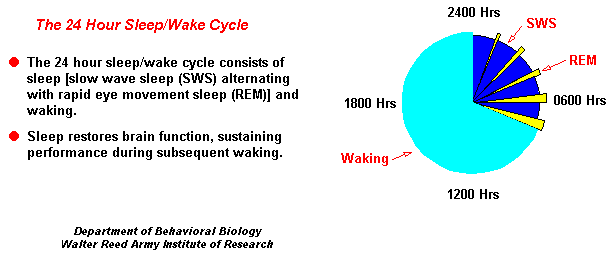
While we know that sleep deprivation impairs performance and adequate sleep restores performance to normal, we are only beginning to understand the brain events that underlie these phenomena.
In collaboration with Johns Hopkins and the National Institutes of health, we have completed a series of studies using Positron Emission Tomography (PET) to study regional patterns of brain activation/deactivation across 85 hours of sleep deprivation and during recovery sleep. These studies show a generalized decline in brain activation over the course of prolonged sleep deprivation; this deactivation is greatest in those brain areas sustaining higher cognitive performance and situational awareness.
The Recuperative Value of Sleep
The recuperative value of sleep depends upon its duration and continuity (Bonnet, 1987). Brief, fragmented sleep has little or no recuperative value, and is similar to total sleep deprivation in its effects on performance. Bonnet (1987) fragmented the sleep of normal volunteers by presenting every 2-3 minutes a tone that continued to increase in loudness until subjects met an arousal criterion. For one group of subjects, the arousal criterion was a full awakening, as indicated by a movement and a verbal response. For a second group, the arousal criterion was a simple postural adjustment, with no verbal response required. For a third group, the arousal criterion was simply a change in the electroencephalogram (EEG), with no movement or verbal response required. All three arousal criteria degraded the recuperative value of sleep as measured by next day alertness and performance. Bonnet's results were not due to sleep restriction, as subjects in all groups had near normal total sleep times. Rather, they were the result of sleep fragmentation. If fragmentation of sleep, even fragmentation with no obvious behavioral manifestation (i.e. the change-in-EEG-only group), destroys recuperative value, then not only duration but also continuity of sleep is important. Bonnet's results are relevant to performance during continuous combat operations—in our consultations to the U.S. Army, we have stressed the need for sleep. Often commanders have taken our advice only to come back with something like "I took a 4-hour nap and woke up feeling no better than when I went to sleep." When asked where they slept, a typical answer was "in the corner of my TOC" (tactical operations center). During continuous operations, the TOC is a busy, noisy place (movement, talk, & radio traffic) 24 hours a day. Behaviorally (as judged by lying still with their eyes closed) these commanders remained asleep for the period of the nap. Their complaint that the naps had no value are likely the result of frequent EEG arousals in response to the ambient noise and movement which fragmented their sleep and destroyed its recuperative value.
Effects of Sleep Deprivation on Performance
Sleep deprivation impairs alertness, cognitive performance, and mood. The ability to do useful mental work declines by 25% for every successive 24 hours awake. We studied cognitive performance using a variety of computer-based performance tests during 72 hours of total sleep deprivation in normal volunteer subjects (Thorne et al., 1983). The data from these subjects (N=8) and their analyses are summarized in the figure (see figure -- 72 Hours of Sleep Deprivation: Performance on Serial Addition/Subtraction).
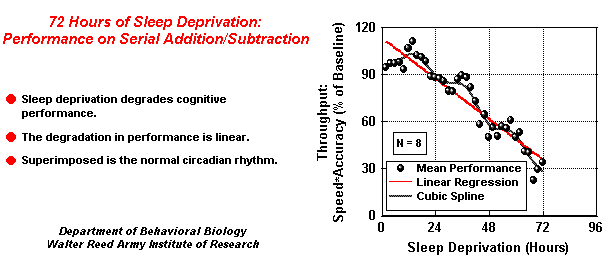
The performance data in the figure are expressed as throughput - the product of speed and accuracy. During sleep deprivation, overall performance typically declines - primarily as a result of a reduction in speed. Accuracy is relatively preserved during sleep deprivation. Throughput measures the combination of speed and accuracy, and reflects the amount of useful (i.e., accurate) work done per unit of time. The next figure (see figure -- 48 Hours of Sleep Deprivation: Performance on Serial Addition/Subtraction) shows performance data from another study of normal volunteers (N=91) over 48 hours of sleep deprivation.
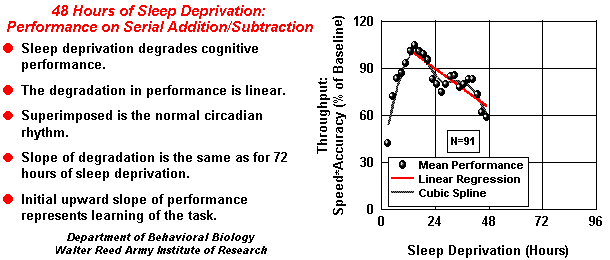
Unlike the subjects in the 72-hour study mentioned above, subjects in the 48-hour study were not pre-trained on the cognitive performance tasks—the initial improvement in performance represents learning. The slopes of the linear regression line in both figures are close to identical. Another figure (see figure -- 85 Hours of Sleep Deprivation: Performance on Serial Addition/Subtraction with Daily 30-Minute Nap) shows performance data from another study of normal volunteers (N=17) over 85 hours of sleep deprivation. Unlike subjects in the first two studies (72 and 48 hours of sleep deprivation) subjects in the 85-hour study were allowed one 30-minute nap each day, as indicated. This short amount of daily sleep decreased the rate of performance degradation as indicated by the decrease in the slope of the linear regression line. The next figure (see figure -- Degradation in Cognitive Performance in Sleep Deprivation with and without 30-Minute Daily Nap) shows a comparison of the regression lines from 72 hours of total sleep deprivation and 85 hours of sleep deprivation with a 30 minute nap each day. As seen, the rate of performance degradation was slowed by the daily 30-minute nap.
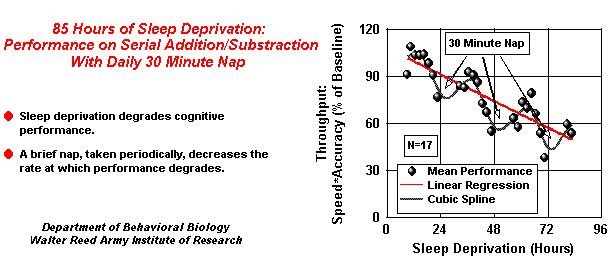
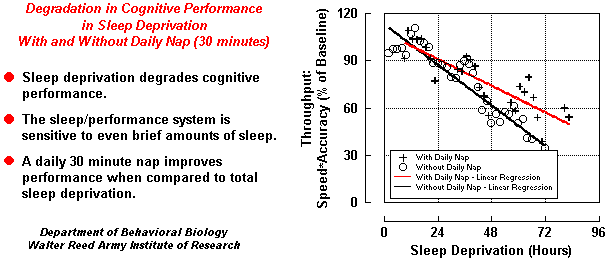
Sleep deprivation degrades complex cognitive performance, including the ability to understand, adapt, and plan in rapidly changing circumstances (Horne, 1988a). A variety of sleep deprivation studies suggest that mental operations involving the prefrontal cortex are particularly sensitive to degradation by sleep deprivation (Horne, 1988a). Thirty-six hours of sleep deprivation produced consistent decrements in cognitive tests involving word fluency and nonverbal planning, both of which are tasks with considerable participation of prefrontal cortex (Horne, 1988b; Horne, 1993).
In contrast to complex mental performance, simple psychomotor performance, physical strength and endurance are unaffected by sleep deprivation. For example, a soldier can shoot as tight a cluster of rounds at a fixed target after 90 hours without sleep as when well rested. However, if shooting at targets that pop up at random locations on a firing range then performance drops to below 10% of baseline (Haslam & Abraham, 1987).
Managing Sleep to Sustain Alertness and Effective Performance in Combat/Operational Settings
The Practical Problem of Managing Sleep to Sustain Alertness and Performance in Operational Settings
Managing sleep to sustain performance is analogous to managing any item of logistic resupply. To make this analogy specific, in managing the logistics of fuel for tanks, one must know 1) the amount on hand and 2) the anticipated rate of consumption to plan for resupply. The same is true for managing sleep to sustain adequate levels of alertness and performance. By and large, commanders understand the value of sleep in sustaining performance. With a few exceptions, most military personnel recognize that total sleep deprivation and brief, fragmented sleep exacts a substantial toll on individual and unit performance. The problem has been that commanders have had no way to objectively assess how much sleep they and their subordinates have obtained and to estimate the impact on individual and unit effectiveness that this will have over the next few hours to days. To return to the diesel fuel analogy, they do not know either how much they have on hand or their anticipated rate of consumption. Thus, they have not been able to rigorously, objectively, and effectively incorporate sleep management into operational planning. The Sleep Management System, under development by the U.S. Army Medical Research and Materiel Command, will provide commanders with the tools to measure sleep and predict subsequent performance at all echelons of command and control. It will provide commanders with the tools necessary to include sleep management in operational planning and to treat sleep as any other item of logistical resupply.
The Sleep Management System
Sleep sustains battlefield awareness—the sum of mental abilities necessary for effective combat performance. Researchers in the U.S. Army Medical Research and Materiel Command (USAMRMC) are developing a field-deployable Sleep Management System. The Sleep Management System will be a component of the Warfighter Status Monitor to be worn by all soldiers in an operational setting. The Sleep Management System will help to maximize individual and unit performance and sustain battlefield awareness during continuous operations. To measure sleep during operations, we have developed the wrist-worn Sleep/Activity Monitor. This device measures and records arm movements, and analyzes these data to estimate sleep duration and continuity (the factors which determine the recuperative value of sleep). To predict the impact of sleep on performance, we have developed, and are refining and validating, a quantitative Sleep/Performance Model. The Sleep/Performance Model integrated into the Sleep Activity Monitor is the core of the Sleep Management System. The Sleep Management System will consist of: The wrist-worn, micro-processor based, self-contained, Sleep/Activity Monitor for unobtrusive measurement of sleep duration, continuity, and timing under operational conditions. The Sleep/Performance Model for the prediction of individual soldier performance based on recent sleep history as measured by the Sleep/Activity Monitor. Modular integration of the combined Sleep/Performance Model - Sleep/Activity Monitor into the Warfighter Status Monitor to be worn by all soldiers.
Measuring Sleep in the Operational Environment: The Sleep/Activity Monitor
The central element of the Sleep Management System is hardware and software to accurately, objectively, and unobtrusively measure sleep in operational settings. Self-reports of sleep (e.g., sleep logs) require effort from the person whose sleep is being measured, are generally unreliable, and give little or no usable information on sleep fragmentation, a critical variable in recuperation. We have developed a wrist-worn, micro-processor based, self-contained, Sleep/Activity Monitor for unobtrusive measurement of sleep duration, continuity, and sleep timing under operational conditions (see figure -- Sample Sleep/Activity Monitor Record).
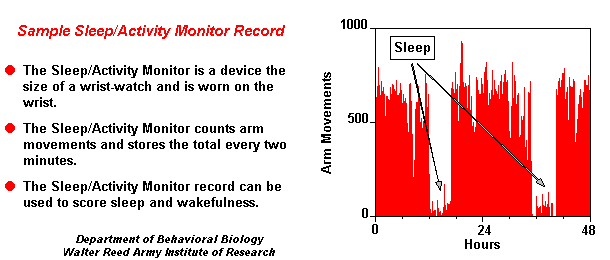
As described above, using the Sleep/Activity Monitor, we have systematically measured sleep in personnel in the Ranger School and at the National Training Center. We have deployed these devices during the Gulf War. The are rugged, robust, and unobtrusive. We developed the Sleep/Activity Monitor in collaboration with Precision Control Design, Inc. The monitor is the size of a wrist watch, and is worn on the non-dominant (usually the left) wrist. It records arm movements, sums the arm movements over two-minute intervals, and stores these sums in on-board random access memory (RAM). The Sleep/Activity Monitor contains a central processing unit (CPU) to manage arm movement data collection and storage, to analyze these arm movement data using a sleep-scoring algorithm to score sleep and wakefulness, and to make performance predictions using a built-in Sleep/Performance Model on the basis of the duration and continuity of the sleep as given by the sleep-scoring algorithm. The Sleep/Activity Monitor is unobtrusive, will record data for up to a month (without battery change or downloading), and has proven robust and reliable in operational environments (Ranger School, National Training Center, & Operation Desert Storm). The current version of the Sleep/Activity Monitor has a display which tells the wearer how much he or she has slept as a daily total for each of the past 14 days and predicts current level of performance based on this sleep history as a % of fully-rested baseline.
Modeling the Effect of Sleep Deprivation on Performance
We have developed a Sleep/Performance Model (McNally et al., 1989), a computer model which predicts present and future performance based on prior sleep amounts. We have constructed this model by taking as anchor points no sleep and 8 hours of sleep. These anchors are based on data indicating that 8+ hours of sleep each night will sustain performance indefinitely, and on our own laboratory data showing that total sleep deprivation degrades performance by 25% for each successive 24 hours awake. Based on other studies, the model also assumes that the bulk of recovery occurs early in the night's sleep (see figure -- Recovery as a Function of Sleep).

We have incorporated our Sleep/Performance Model into the Army Unit Resiliency Analysis (AURA) model of artillery battery performance (see figure -- Sleep/Performance Model Prediction of Artillery Battery Productivity during Continuous Operations).
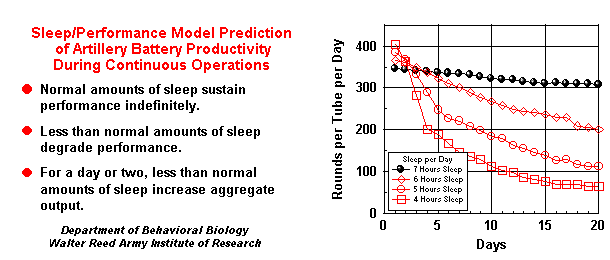
The model predicts that 7 hours or less of sleep per night leads to degradation of performance. For a day or two, the model predicts that the shorter-sleep artillery batteries will outperform the longer-sleep ones (in terms of rounds per tube per day accurately delivered to the target) because they have more hours each day in which to fire rounds. However, by the second or third day, the model predicts the they will fire fewer accurate rounds over the 24 hour period even though they spend more time firing. To refine and validate our Sleep/Performance Model, we are undertaking a study in normal volunteers of the effects on performance of 3, 5, 7 or 9 hours sleep each night for 8 consecutive days. Note that the model predicts that even on four hours sleep/night soldiers can fire rounds accurately down-range for 2-3 weeks. However, they will be much less efficient and overall less productive. At 15 days into the simulation the 4 hour sleep/night battery is firing less than a third of the rounds that the 7 hour sleep/night battery is firing. Obviously, there are frequently situations in combat and other operational settings were adequate sleep is not possible because of the external exigencies. However, the above makes clear that a commander should not have a deliberate policy of short-changing himself or his soldiers of sleep, expecting to get more aggregate work done. On the contrary, the commander should insure adequate sleep for himself and his subordinates if at all possible.
Integration into the Warfighter Status Monitor
The Sleep Management System is being designed for integration into the hardware and software of the Warfighter Status Monitor, to be carried by all soldiers in the operational environment. As a modular component of the Warfighter Status Monitor it will add less than 100 grams to the soldier's load.
Sleep, Sleep Deprivation, Continuous Operations and Command Responsibility
Let us return to the friendly fire incident during the Gulf War involving the platoon of Bradley Fighting Vehicles in which, during a fire fight, the two Bradleys on the right flank of the platoon destroyed the two Bradleys on the left flank of the platoon. Assuming the correctness of the conclusion that sleep deprivation played a role in this friendly fire incident, how would this incident have played out if the Sleep Management System had been in operation? The crews of the Bradley fighting vehicles would have been individually instrumented with Sleep/Activity Monitors. The data on their sleep times and the predictions regarding their performance would have been available to the soldiers themselves and through a local area radio-frequency network to the soldiers chain of command. My own observation of the soldiers and commanders in the unit in question is that they were trained, skillful, competent, and dedicated. As is true for all friendly fire incidents with which I am familiar, not one of those involved had any desire to be on the perpetrating or receiving end of friendly fire. It is also true that when you give such people the information necessary to gauge risk and to take appropriate action to reduce risk, and convey to them that they have the authority and responsibility to do so, they will do so as a matter of course. So, given the information on their accumulated sleep and the attendant predicted decrement in performance, the personnel of the Bradley platoon would have instituted an effective sleep plan while still in Saudi Arabia and kept to it through the Ground War. Had they not done so, the same data being available to their chain of command, their immediate superiors would have told them to do so. Being well-rested and alert, the personnel of the Bradley platoon would have sustained their situational awareness. When the column of Iraqi armored personnel carriers were first visible in the thermal sights, they would have immediately engaged and destroyed the Iraqi vehicles, rather than waiting until they closed to within meters of the screen line. Even had the Iraqis reached the screen line, the two Bradleys on the right flank, through their grasp of the tactical situation, would have been aware that they were in danger of enfilading their own line and held their fire. To modify a phrase from S.L.A. Marshall: Information is the cure. The availability of this information in terms of sleep times and performance predictions, will allow the incorporation of sleep management into operational planning at all levels of command and control.
Summary and Conclusions
A critical element in self-care at all levels of command and control is getting adequate sleep. Our Sleep/Performance Model, grounded in empirical findings in the laboratory and the field, suggests that 7-8 hours of sleep each night are necessary to sustain high levels of performance over days and weeks. The consequence of not getting adequate sleep is reduced mental abilities, specifically the higher order mental abilities that sustain situational awareness and tactical grasp. The consequences are reduced individual and unit effectiveness, errors, accidents, increased casualties from enemy action, and friendly fire incidents. These affect the outcome of the immediate operation and may degrade the soldiers' abilities to sustain effectiveness in future operations and subsequently to lead a full and fulfilling life. Managing sleep to sustain performance has been difficult because although the effects of sleep deprivation are well known, there have been no tools to measure sleep in soldiers under operational conditions and to translate these measures into predictions of consequences for performance. These tools will soon be available in the form of the Sleep Management System integrated into the Warfighter Status Monitor. Combining education in the human neurobiology of sleep with the tools provided by the Sleep Management System, commanders will be able maintain their own and their unit's effectiveness, reduce casualties, improve operational outcome and increase their own and their soldiers' chances going on to lead full and fulfilling lives.
References
For further information on sleep, sleep deprivation, and continuous operations as well as on operational and deployment stress, see the Walter Reed Army Institute of Research Home Page on the World Wide Web (http://wrair-www.army.mil).
Banderet, L.E., Stokes, J.W., Francesconi, R., Kowal, D.M., Naitoh, P. (1981) Artillery teams in simulated sustained combat: Performance and other measures. pp. 581-604 in DHHS (Department of Health and Human Services) NIOSH (National Institute for Occupational Safety and Health) Report 81-127: The Twenty-Four Hour Workday: Proceedings of a Symposium on Variations in Work-Sleep Schedules, L.C. Johnson, D.I. Tepas, W.P. Colquhon & M.J. Colligan, eds. Washington, DC: Government Printing Office
Belenky, G., Marcy, S.C., & Martin, J.A. Debriefings and battle reconstructions following combat. In Martin, J.A., Sparacino, L. & Belenky, G. (Eds.) The Gulf War and Mental Health: A Comprehensive Guide, Praeger, Westport, CT, 1996.
Bonnet, M.H. (1987) Sleep restoration as a function of periodic awakening, movement, or electroencephalographic change. Sleep 10:364-373
English, John A. (1984) On Infantry (pp. 145-47) New York: Praeger
Haslam, DR. & Abraham, P. (1987) Sleep loss and military performance. In G. Belenky (Ed.), Contemporary Studies in Combat Psychiatry (pp. 167-84), Westport, CT: Greenwood Press
Horne, James A. (1988a) Why We Sleep: the Functions of Sleep in Humans and Other Mammals (pp 13-75) Oxford: Oxford University Press
Horne, James A. (1988b) Sleep loss and "divergent" thinking ability. Sleep 11(6):528-536
Horne, James A. (1993) Human sleep, sleep loss and behavior. Implications for the prefrontal cortex and psychiatric disorder. Br J Psychiatry 1632:413-419
Marshall, S.L.A (1978) Men Against Fire (pp 138-156) Gloucester, MA: Peter Smith McNally, R.E., Machovec, A.M., Ellzy, D.T. & Hursh, S.R. (1989) SAIC Contract No. MDA903-88-D-1000: Evaluation of Sleep Discipline in Sustaining Unit Performance, McClean, VA: Science Applications International Corporation
Pleban, R.J., Valentine, P.J., Penetar, D.M., Redmond, D.P., and Belenky, G. (1990) Characterization of sleep and body composition changes during ranger training. Military Psychology 2:145-156
Thorne, D.R., Genser, S.G., Sing, H.C. Hegge, F.W. (1983) Plumbing human performance limits during 72 hours of high task load. pp 17-40 In Proceedings of the 24th DRG Seminar on the Human as a Limiting Element in Military Systems (pp. 17-40), Toronto: Defence and Civil Institute of Environmental Medicine